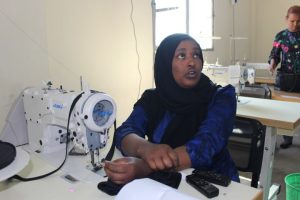
ADDIS ABABA – Strengthening national initiatives like ‘Made in Ethiopia’ with international support can accelerate economic transformation, drive sustainable growth, and contribute meaningfully to global food security, according to Industry Minister Melaku Alebel.
The Minister emphasized that the ‘Made in Ethiopia’ movement-a flagship initiative rooted in the success of integrated agro-industrial parks and advancements in agri-business-has revitalized over 400 enterprises, showcasing Ethiopia’s vision for industrialization, food security, and economic sustainability. However, Ethiopia’s journey toward sustainable food security hinges on continued collaboration and investment from the global community. “We need optimal investment to enhance production and productivity in rural areas through agro-processing,” he stated, stressing the importance of public-private partnerships and international support.
Ethiopia is committed to building a resilient food system that ensures reliable access to nutritious food. This vision requires innovative and sustainable approaches that can withstand climate and resource challenges. A key component is agro-processing, which transforms raw produce into market-ready goods, reduces waste, extends shelf life, and creates economic opportunities in rural communities. “Our integrated agro-industrial parks are already making a significant impact,” Melaku added.
With substantial investment, three integrated agro-industrial parks are operational, connecting over 140,000 smallholder farmers to markets and creating more than 70,000 permanent jobs. Ethiopia aims to establish a minimum of 17 agro-industrial parks nationwide, starting with seven pilot projects that have spurred production in rural areas.
The Minister called on international partners to join Ethiopia in advancing priorities like the development of agro-industrial parks, capacity building, value chain enhancement, and organic certification to improve global competitiveness.
UNIDO Director General Gerd Muller stressed that investment is key to solving hunger. “We must mobilize much more investment and forge technology partnerships between industrialized and developing countries. Despite urgent need, investment in agriculture has declined in recent years,” he said, adding that agriculture spending, especially in developing regions, is falling short of meeting food security demands.
According to Muller, ending world hunger by 2035 would require an additional 50 billion USD in annual agricultural investment focused on rural areas, technology, and irrigation. “UNIDO stands ready to support agribusiness entrepreneurs, address financial constraints, and facilitate knowledge transfer. Together, we can mobilize the resources needed for resilient, sustainable food systems,” he stated.
He concluded with a call for swift action: “The sooner we invest the more cost-effective and impactful it will be. By working together, we can build a food-secure world for today and future generations.”
BY BETELHEM BEDLU
THE ETHIOPIAN HERALD THURSDAY 7 NOVEMBER 2024





